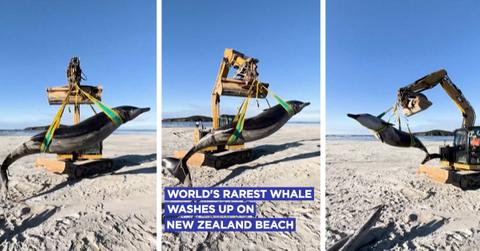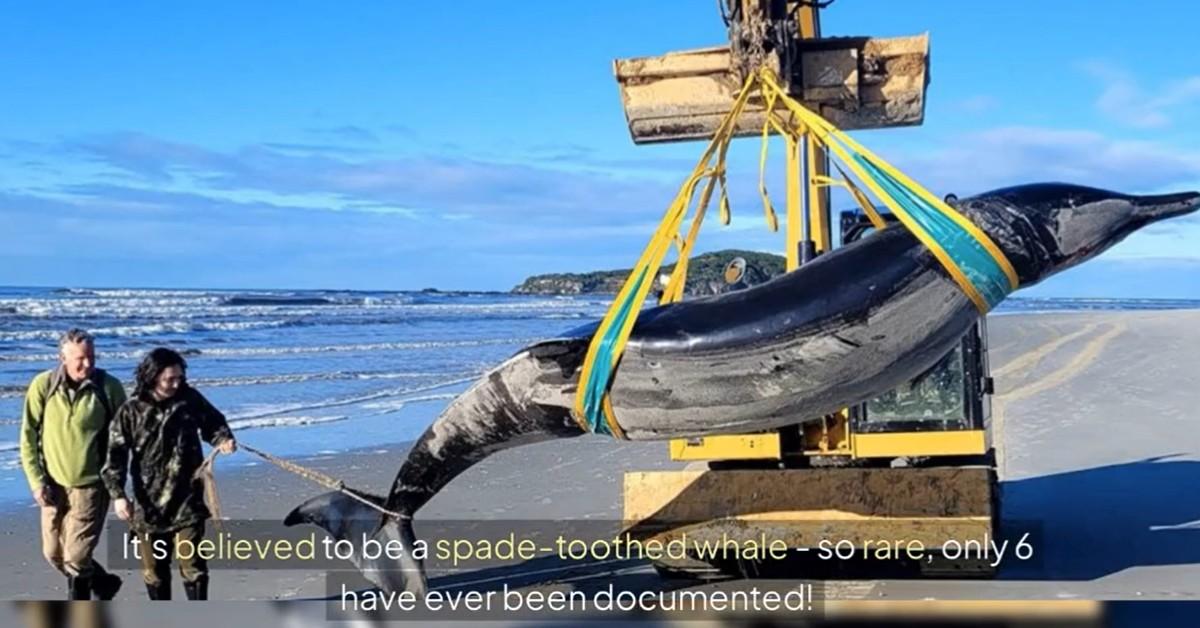The Recovery of a Rare Spade-Toothed Whale Might Unlock New Ocean Secrets
The whale has never been seen alive.
Published July 16 2024, 2:48 p.m. ET
Researchers and conservationists had something to celebrate in July when the body of a rare spade-toothed whale washed up on a beach in New Zealand. While the whale was unfortunately dead by the time they were discovered, researchers say they'll be able to use the whale's remains to unlock some of the secrets of the mysterious mammal.
With no footage ever captured of a living spade-toothed whale and no information about what parts of the ocean they call home, this could be an amazing breakthrough for researchers. Learn more about what the experts do know about the spade-toothed whale below, including why it's been so hard for them to make any real discoveries about the creature in the past.
What is a spaded-toothed whale?
According to the Associated Press (AP), the spaded-toothed whale is one of the rarest whales in the world since nobody has ever seen one in the wild. There's so little known about them that one of the advisers for the New Zealand Department of Conservation told the AP that the study of the whale could produce some "world-first information."
According to the BBC, the body was discovered on July 4, 2024, at the mouth of the Taiari river on South Island. The most recent whale marks the seventh potential spaded-toothed whale uncovered since the species' initial appearance.
Unfortunately for scientists, every previous body that has washed ashore has either been recovered before modern science, not in the right shape to study, or buried before being verified. The AP notes that the first bones believed to belong to a spear-toothed whale were found in 1872.
Experts have come a long way in learning what little they do know, even going as far as to create DNA sequencing that helped establish the differences in these species from those of other beaked whale varieties.
Why doesn't anyone know anything about the spade-toothed whale?
The reason there's limited research about the whale likely has to do with their physiology. The shape of their mouths and teeth seemingly indicates that they have to dive deep for their food, meaning they likely live way below the ocean's surface and rarely come up to the shallower waters.
Due to the sheer vastness of the Pacific Ocean where these mysterious creatures are believed to spend their lives, it would be next to impossible for researchers to initiate exploratory dives in the hopes of seeing one.
Why is the spade-toothed whale sacred?
According to the AP, researchers and scientists will work closely with the local Māori iwi as they decide everything from how to examine the whale to what to do with the elusive creature's remains.
The whale is what Indigenous tribes consider a taonga, which means sacred treasure. But the recovery of the spear-toothed whale presents more than a cultural significance for the Māori — a recent change to local treaties now recognizes whales as "legal persons," to protect them, per the New York Times.
Researchers in New Zealand will have a lot to keep them busy while they work out the logistics with the Māori people. Until then, scientists and laypeople alike will wonder how little we know about the ocean and how many other mysterious creatures like the spade-toothed whale lurk below its surface.

